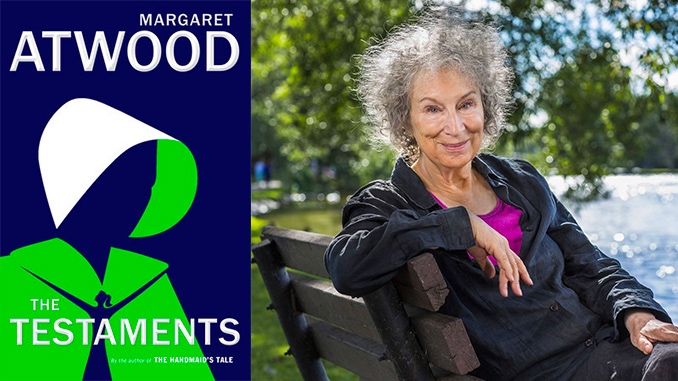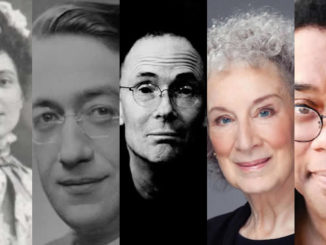It’s a mistake to call The Handmaid’s Tale “prescient.”
Applying that label does a disservice to Margaret Atwood, and a disservice to the point she was trying to make. Her 1985 classic was never intended as a prediction: it was always, first and foremost, a mirror.
An exaggerated mirror, of course. One that reflected the deep-seated misogyny of its time (and all time), and in which existing practices – here’s Atwood describing being forced to serve tea and cookies to her male Harvard classmates – are taken to their extreme, logical (if irrational) conclusions.
But a mirror, nonetheless.
This is, I think, something that Atwood has herself dwelled on in the three-plus decades since The Handmaid’s Tale made her a literary star, and especially in the past two years as it has turned her into something of a cultural phenomenon. She didn’t predict – couldn’t have predicted – the election of a Misogynist-in-Chief, the rise of the so-called alt-right, incels. But she didn’t need to: violent misogyny, religious extremism, and ethnonationalism have all been with us since the very beginning – and (with apologies to the utopian Canada found in Atwood’s novels) we are not exempt.

That’s why it’s so interesting that in her latest novel The Testaments, certainly one of the most belated literary sequels ever written, we find Atwood concerned with, well, the sequel to all of the above. In other words, what comes after all the darkness and despair.
As it turns out, the answer is: Warmth. Kindness. Even something like optimism.
Not words you’d necessarily expect to read in relation to an Atwoodian dystopia. But then, this isn’t the kind of novel you’d expect in the first place.
DON’T CALL IT A COMEBACK
If it’s strange to be writing about a Margaret Atwood sequel, it’s even stranger to find myself describing our beloved 79-year-old Torontonian as The pop culture icon of 2019. (Now that’s something she never could have predicted.)
But here we are. Hot on the heels of a TV-spurred Atwoodnaissance (in addition to Hulu’s Handmaid’s Tale, there was also a very good Sarah Polley Atlas Grace miniseries a couple years ago), Atwood has opted to revisit the world of Gilead in a sequel both wholly unnecessary and yet undeniably appropriate.
Sure, it’s a cash-in of a sort. But whoever said authors shouldn’t make money? And who cares when the final product is this good?
WE’RE DOING A SEQUEL (THAT’S WHAT WE DO IN HOLLYWOOD)
The Testaments acts as a more-or-less direct sequel to the Handmaid’s Tale. Picking up not long after the events of the original, and featuring a mix of new and returning characters, it revisits the dystopian Gilead as it was, albeit with a heavy emphasis on both its origins and its future.
Told from three perspectives, of which I will remain suitably vague, it follows not handmaids this time but women in other roles: Aunts, Wives, and the missionary Pearl Girls. Each class slots (un)comfortably into Atwood’s established framework of a deeply misogynistic society in which women are forced into various subservient roles. A kind of misogynist’s divide-and-conquer, if you will. Though naturally, this being Atwood, the story is also about women’s subversion of those roles and of society’s expectations.
Indeed, to say that Offred’s original rebellion was but one crack in the façade is to only hint at the extent to which those in Gilead are all, or nearly all, chafing under its rule. Rebellion and resistance are major themes in The Testaments, and Atwood affords significantly more space to the idea that underneath all the evil and cruelty, strains of goodness and optimism persist. Even the dreaded Aunts are given the chance to display some decency and humanity.
FUTURE PROOF
On that note, The Testaments is more expansive in scope than its predecessor. Where the original focused on the constrained and in some ways claustrophobic lives of handmaids in general and Offred in particular, the three narratives here offer a much broader view of the world of Gilead: how it works, what secrets it holds, and its many and seemingly inevitable flaws.
That does come with at least one narrative flaw: Atwood’s valiant but largely unsuccessful attempt at expanding on Gilead’s origin story. Though most of the novel takes place post-Handmaid’s Tale, there are significant sections devoted to retelling the early days of Gilead. Certain aspects of these sections work well, such as the depiction of how perfectly ordinary individuals can be transformed into inhuman monsters; Hannah Arendt’s “Banality of Evil” on full display.
But when it comes to describing the specifics of the United States-to-Gilead transition, the exact (fictional) events and the parties responsible, Atwood’s insistence on explaining that origin doesn’t quite work. In some ways, it actively undermines her work: the more Atwood gets into the how, the why, and especially the who of Gilead, the easier it becomes to lay the blame on that one particular strain of religious/cultural (and decidedly American) thought. That a reader could walk away from The Testaments and think, “well sure, them, but not us” is, I think, a failing of the novel.
That said, The Testaments is just as if not more concerned with the future of Gilead. Not so much the future visited in the original novel’s postscript, but the more immediate post-Offred future, and what Atwood views, I think correctly, as the inevitable decline of such a society. To say too much might constitute a spoiler, but The Testaments does an excellent job of picking up the threads of dissension present or hinted at in Offred’s story, and expanding on them in a way that feels plausible. As it turns out, Offred was never really alone.
LAUGHING TO KEEP FROM CRYING
Atwood is, of course, a wonderful writer. Her prose is vivid, if not particularly sophisticated, and she certainly knows how to put together an enthralling, entertaining story. Even as The Testaments abandons some of its literary lustre, devolving into an old-fashioned adventure yarn in the latter part of the book, it never ceases being a joy to read.
And while we can quibble over whether Atwood is truly a genre writer, one thing she has in common with the masters of sci-fi/fantasy is a sense for world-building. Gilead feels fleshed out, more so than in The Handmaid’s Tale, and Atwood even takes some time to explore what’s happening in the rest of the world. Though again, I still think she’s too soft on Canada.
Also present here is Atwood’s trademark sense of humour. It’s a dark humour, to be sure, but as a writer and interview subject she has long evinced a wry and witty cynicism capable of cutting right through the bullshit, whatever bullshit that may be. The Testaments is hardly a funny novel, but Atwood is cognizant of the fact that even in the darkest of times, there’s room and even a need for moments of lightness. There may not be a lot of jokes, but when deployed they land beautifully and with impeccable timing.
Many of Atwood’s funniest lines are subtle, awarding the sharp-eyed reader: one of my favourites involves the naming of suits in a Gilead deck of playing cards, and there’s at least one gloriously silly Elizabeth Moss pun lurking in these pages. Meanwhile, the list of proscribed books in Gilead, though not quite a joke, should elicit a knowing chuckle or two.
Atwood also has a keen eye to some of the more blackly humorous aspects of authoritarianism, especially that which I’ve taken to calling “irony deficiency”. To take but one example: at Gilead HQ there’s room for both a Schlafly Café and a Hildegard Library.
HER STORIES
The Testaments is fun. Some terrible things happen, yes, and they happen in a fairly abominable environment. But the novel is full of generally decent characters, doing generally decent things, and in a very classical sense divided between good and wrong, black and white. In that way, Atwood’s futuristic novel is surprisingly old-fashioned: the only shades of grey come from the dark side – Atwood’s newfound interest in portraying her villains as less malevolent, more sympathetic – while the good guys – er, girls – remain simply that: good.
That said, it’s also telling – or maybe just one last dark joke – that the final voice in the book belongs to a man. It’s actually one of the few characters we’ve met before – I promise this isn’t really a spoiler – but having him steal the spotlight from Gilead’s many female perspectives feels both disappointing and somehow apposite.
For if The Testaments reminds us of nothing else, it’s that the threat always remains. That’s as true today as it was in 1985, and it will remain true for the (un)foreseeable future.
JG


